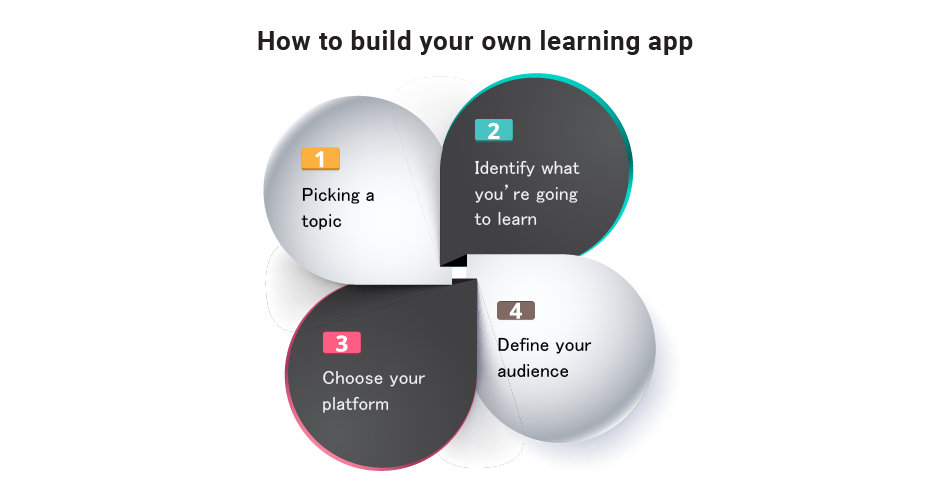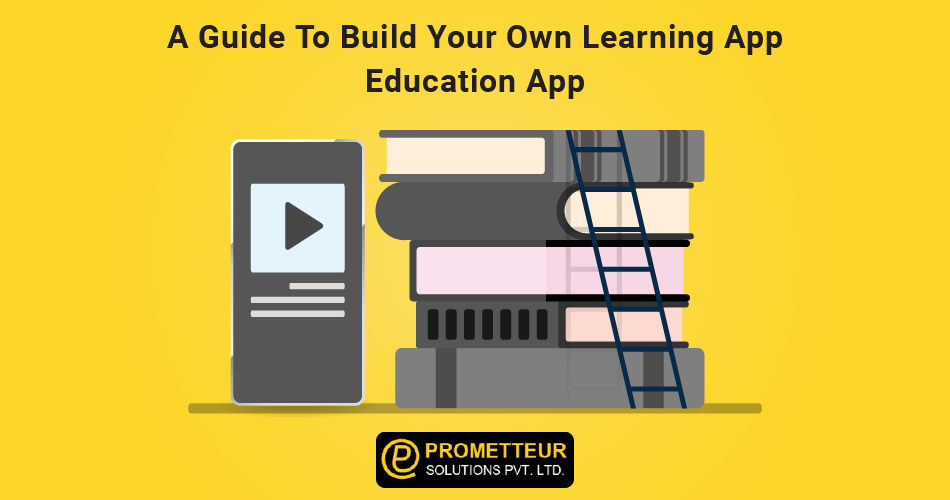The digital age has transformed the way we learn and what we learn. Today, schools and workplaces are increasingly becoming dependent on computers, tablets, and smart devices. With the emergence of the omnipresent internet, we’ve become connected to more information than ever before. We can access everything from our favorite books to articles written by experts in any academic field that interest us. This has made it possible for people to learn at their own pace, choosing topics according to their interests. It’s also led to a new wave of education apps aimed at making learning accessible for everyone. Here are some suggestions about how you can build your own learning app in 2021!
How to build your own learning app
Picking a topic

Picking a topic is the first step in any new learning app, whether it’s related to computer science or music. You can find great information about almost any subject in the world through online databases, the web, and even Google. In this guide, we’re going to concentrate on education, but it’s not limited to that. You can also do research in the world of music, art, or history. The important thing is to start learning!
Identify what you’re going to learn
If you want to learn something, you’ll need to invest a lot of time and effort into finding the right information. Sometimes that information doesn’t come easy and without any work on your part. If you want to learn anything, it should be easy to find the information you need — we use Google for everything else! Why not explore it for your learning app?
Before you do anything else, you’ll need to identify what you’re going to learn. Once you do that, you can begin to think about what data to collect, and how. At times, the information you collect might not be easy to find. You’ll need to ask people for information if you need it. Some people carry out surveys and use the outcome as data for creating their products.
Choose your platform
When mobile applications are limited to one platform it makes them inconvenient for your users. It’s important to make your app accessible to all users, regardless of what operating system they use. It’s discouraging for your users to know that they can’t use your app if they don’t have a certain type of computer or phone. This is unfair and can cause them to feel rejected from your company, which could also lead to the end of their support from you.
Fortunately, hybrid or cross-platform mobile application development services can help with this issue by providing you with a mobile application that is compatible with various operating systems and devices. This allows you to create a mobile app for all devices and users.
For the convenience of your users, it’s best to make your app available on as many platforms as possible. Today, mobile platforms are incredibly important for the success of an app. For example, Apple’s iOS App Store has a lot of active users, with a seventy-five percent growth rate since 2016. In addition, Android has more than 1 billion active users. Similarly, while the web offers a range of diverse options, we should keep in mind that education is a specific field.
We don’t need to compromise the user experience by building an app that’s meant for one platform and one device. Our app can take advantage of the diversity of devices, media, and platforms, offering a wider variety of content to users. Therefore, consider building a cross-platform or a hybrid app.
Define your audience
When trying to reach out to an audience, it can be difficult trying to figure out who will be interested in using your app and who won’t. Figuring out who will be interested in using your app is the most important step in the process of growing your business. If you target the wrong people with your marketing tactics, then all of your efforts will be wasted.
Determine who you want to reach out to and who you don’t want to reach out to
After you’ve come up with a concept, you’ll need to figure out who your target audience is, or who will be interested in using your mobile app.
Some of the essential factors necessary to develop your own music app in 2021 include your audience’s tastes for learning, demographics, age, geography, and other information. If you’re targeting a certain place, you might want to include some local examples to pique your audience’s interest.
Select the app features
Choose from a variety of features
Customers search for a variety of features in learning applications when utilizing them. You might consider adding them into your learning app to better suit your consumers’ requirements. You may also use new technology to create extra features to give customers more and differentiate yourself from the competition. The following are some of the most common features that your app should have:
Courses of exceptional quality:
It is difficult to find a course that gives substantial and high-quality content. People are looking for insightful courses that provide clear and concise lessons and bonus material for students. The course should cover all the important topics while providing helpful feedback on how to improve your writing skills.
Downloading and offline study options
The offline study options are perfect for those who are not able to access their courses online. The downloads are also great if the internet is not available. Offline study options may be available for a small fee, but many learning apps offer this for free.
Use the search function to quickly find certain courses
The search function is one of the most important tools in learning apps. It allows users to find courses that are relevant to them, their interests, and their goals. Users love it when they can use keywords to help focus their search for courses:
Course suggestions for the future
One of the most important considerations for students in their career. Some people are not sure what their future will look like, which makes it difficult for them to choose the right course of study. Questions like, “What do you want to do?” or “What are your interests?” are important considerations when deciding on a course. your learning app should be able to help such people answer their questions and set them on the right path on why they should take your course.
Give a feedback and rating with ease and accessibility
“I like the interface and how easy it is to use. It gives you a lot of options and I like that.”
“The features are great and it’s easy to customize, but the free version doesn’t allow you to save your work.”
“I was able to create feedback easily with this tool. The only thing I didn’t like about it is that the free version allows you to view your feedback, but not save it or share it with others.” Feedbacks like these help you to develop your app to suit the needs of your users.
An easy-to-use interface: An easy-to-use interface is what every user is looking for.
Design your app
Knowing where to begin, which app platform to use, and which app model to create, is the first step of the digital education process. There are hundreds of different mobile app platforms, such as those offered by Apple, Google, and others, and thousands of learning apps that rely on them. Choosing which one to use and which strategy to follow is the main factor that will determine your success.
Tip: Before starting on your app project, it’s a good idea to research the competitors’ apps and to use their app-specific strategies to increase your chances of success. At the moment, Apple’s and Google’s market share in education has been growing and they remain the leaders. Both platforms are known for their capabilities of monetizing their apps.
Developing the content
Unless you’re an expert in the field, it’s unlikely that you’ll be able to publish an in-depth technical report on a technical subject in the same way that you could if you studied it for a semester in college. However, it’s still possible to create a comprehensive technical report if you follow a few guidelines. Firstly, don’t expect to see a typical 8,000-word article in the best books on the subject.
Start by creating the book in a functional style that follows a strict structure. Don’t worry too much about getting lost in the details of the structure if you can’t quite find the way forward at the start. The amount of content you need will depend on the subject you’re writing about and the topic.
Get A License
You must follow the regulations for offering copyright courses to your audience while building your mobile learning app. If you fail to comply with any required license, you risk being charged with copyright infringement and facing fines. As a result, always obtain a license before releasing your software.
Marketing your app
Research the right competitors.
In the upcoming years, an ever-increasing number of people are expected to acquire a smartphone. According to a study conducted by the Pew Research Center, the percentage of Americans with smartphones will have increased from 61.2% in 2014 to 78.9% in 2020. This means you can target a high-enough number of people who are interested in your subject. The study also reports that 52% of smartphone users in the United States have access to the internet while they are out and about. This means that a good number of people will probably search for information online.
Focus on reaching people on their mobile device
According to ComScore, the percentage of Americans who get their news on mobile devices is increasing. So it is very important to build a mobile-friendly mobile app for learning.
Developers of Professional Learning Apps
Now that you’ve completed all of your preparation, it’s time to put your plans into action. You must start from the ground up with your mobile learning app. So, in order to achieve the needed efficiency and functionality in 2021, we propose that you engage only expert app developers to create your own learning app.
Don’t pick any random developer just because they’re providing you with a better deal. Inquire about their experience and talents, as well as any portfolios they may have. If you have the time, look at their prior work to get a sense of their competence. Take your time choosing a developer and make sure you pick a reputable one.

The Future of the Learning App Industry
The learning app industry is at a crossroads. Although new services and applications have helped to increase the speed of learning, there have also been various ethical controversies in the field, as the unethical actions of Udacity and Coursera. There is also the issue of privacy and data privacy. It’s a complex and tricky situation that is constantly evolving.
Regardless of these factors, there’s no question that the future of learning apps is bright.
Conclusion
The creation of new learning apps has become a major trend among corporations and startups alike. Each one offers a unique way of learning and has the potential to change the way we approach learning altogether. I hope these apps make it into your list of new learning apps in 2021!
